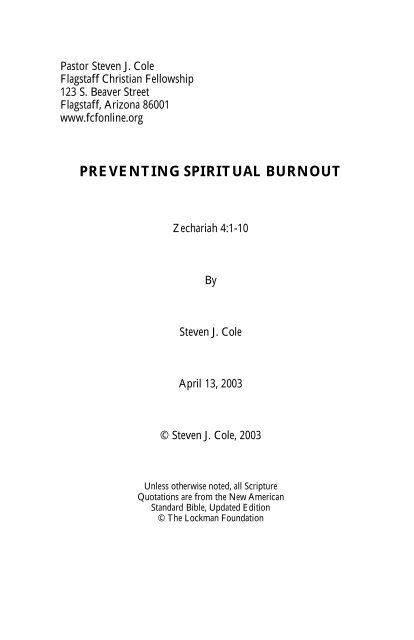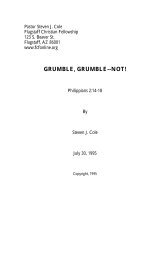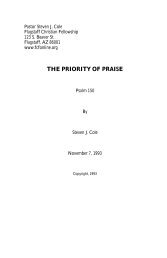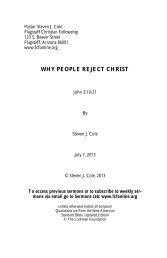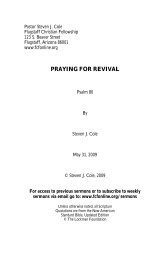PREVENTING SPIRITUAL BURNOUT - Flagstaff Christian Fellowship!
PREVENTING SPIRITUAL BURNOUT - Flagstaff Christian Fellowship!
PREVENTING SPIRITUAL BURNOUT - Flagstaff Christian Fellowship!
Create successful ePaper yourself
Turn your PDF publications into a flip-book with our unique Google optimized e-Paper software.
Pastor Steven J. Cole<br />
<strong>Flagstaff</strong> <strong>Christian</strong> <strong>Fellowship</strong><br />
123 S. Beaver Street<br />
<strong>Flagstaff</strong>, Arizona 86001<br />
www.fcfonline.org<br />
<strong>PREVENTING</strong> <strong>SPIRITUAL</strong> <strong>BURNOUT</strong><br />
Zechariah 4:1-10<br />
By<br />
Steven J. Cole<br />
April 13, 2003<br />
© Steven J. Cole, 2003<br />
Unless otherwise noted, all Scripture<br />
Quotations are from the New American<br />
Standard Bible, Updated Edition<br />
© The Lockman Foundation
April 13, 2003<br />
Zechariah Lesson 5<br />
Preventing Spiritual Burnout<br />
Zechariah 4:1-14<br />
When I began to serve as a pastor 26 years ago, just six weeks<br />
shy of my thirtieth birthday, I was extremely unsure of whether or<br />
not I could do it. I didn’t know whether I could prepare new sermons<br />
each week without running dry after a short while. I didn’t<br />
know if I could handle the other aspects of the ministry: providing<br />
leadership and vision for the church, giving biblical counsel to<br />
those in need, working graciously with difficult people, discipling<br />
current and future leaders, conducting weddings and funerals, and<br />
handling day to day administrative tasks.<br />
That church was small and had never supported a full time<br />
pastor before, and so there was the added concern of whether or<br />
not the finances would be there week to week to meet our needs.<br />
And so with some anxiety and an overwhelming sense of personal<br />
inadequacy, I said, “Lord, I’ll try this for three years and then we’ll<br />
see where we’re at!”<br />
By God’s grace alone, here I am 26 years later, still with some<br />
anxiety and an overwhelming sense of personal inadequacy, hanging<br />
on! I am not exaggerating or being modest when I say that if<br />
God pulled the plug on me tomorrow, I wouldn’t last a month in<br />
this ministry. I have often felt like Peter, walking on the water,<br />
thinking to myself, “What am I doing out here Why did I ever get<br />
out of that boat” and at the same time praying, “Lord, if You<br />
don’t hold me up, I’m going under!”<br />
Charles Simeon (Expository Outlines on the Whole Bible [Zondervan],<br />
10:460) said it well, “We see how dependent a little infant is<br />
on its mother; and such must we be in the arms of God. We must<br />
undertake nothing in our own strength: in no circumstances whatever<br />
may we lean to our own understanding: whatever is devised,<br />
or whatever is done, the creature must be nothing; but God must<br />
be all in all.”<br />
We hear a lot today about stress and burnout, especially in<br />
ministry. It’s a complex problem that includes many factors that I<br />
1
cannot delve into in this message. Sometimes burnout stems from<br />
faulty time management or from being over-committed. Sometimes<br />
it results from trying to do it all yourself and not delegating properly.<br />
Our text does not deal with these aspects of the problem, nor<br />
will I. But it does give us two principles that offer significant help<br />
in preventing spiritual burnout:<br />
To prevent spiritual burnout, see the importance of God’s<br />
work and depend on the continual supply of His Spirit.<br />
The work that God gives us is to be His lampstand, both corporately<br />
and individually. The only way that we can fulfill that task<br />
is by depending on the continual supply of the oil of God’s Spirit.<br />
In that way, we will burn for God without burning out.<br />
Zechariah’s fourth vision (chapter 3) encouraged Joshua the<br />
high priest with the message: “God will cleanse His chosen people<br />
through Messiah and use them to serve Him.” His fifth vision<br />
(chapter 4) encouraged Zerubbabel, the civic leader, with the message:<br />
“The temple that you have begun will be completed and My<br />
people will become a light unto the nations under Messiah. This<br />
will not be accomplished by human effort, but by My Spirit.” In<br />
the fourth vision we saw the cleansing that is necessary before anyone<br />
can serve God. In the fifth vision we see the testimony that<br />
results from a cleansed and Spirit-filled life. While our text will ultimately<br />
be fulfilled with Israel in the Millennium, it also applied to<br />
God’s people in Zechariah’s day and it applies to us as we seek to<br />
be God’s light to the nations.<br />
Zechariah saw a lampstand of gold with seven lamps and a<br />
bowl at the top, which served as a reservoir for the oil. Two olive<br />
trees, each with a branch, stood beside the lampstand. A golden<br />
pipe extended from each branch to the bowl so that the golden<br />
olive oil poured from the tree. Out of the reservoir or bowl (according<br />
to most commentators) came 49 spouts or pipes, seven to<br />
each of seven lamps on the lampstand. This lampstand was similar<br />
to the one that stood in the holy place of the tabernacle, with three<br />
exceptions: (1) the bowl on top of it; (2) the seven pipes to each<br />
lamp; and, (3) the two olive trees. These additions point to the<br />
abundant, continual supply of oil to the lamps. In the temple, the<br />
priests had to keep the lamps full of oil, but in this vision, the supply<br />
of oil flowed constantly without help from any man.<br />
2
The lampstand signifies the important task that God gives to<br />
His people to be a light to the nations, to reveal God and His truth<br />
to those who walk in darkness. The oil that flows in continual<br />
abundant supply so that the lamps can go on burning symbolizes<br />
the Holy Spirit. The two olive trees represent the priestly and kingly<br />
offices in Israel, with the two branches being Joshua and Zerubbabel.<br />
Together these two anointed ones were a type of the Lord Jesus<br />
Christ in His offices of Priest and King. Jesus is God’s<br />
Anointed One (that’s what “Messiah” or “Christ” means), who<br />
provides the Holy Spirit in abundant supply to His people.<br />
The Lord encourages Zerubbabel (4:7-9) by assuring him that<br />
in spite of the mountain of problems in rebuilding the temple, he<br />
would finish the task. This would confirm to all of God’s people<br />
that He had sent His Messiah-Servant (“me” in 4:9b), in the person<br />
of the angel of the Lord, to His people. The old timers, who were<br />
disparaging this temple in comparison to the former one, should<br />
not despise the day of small things (4:10). Under God’s perfect<br />
providence (the seven eyes of the Lord, which range over the earth<br />
to watch over His people), the project will be completed. With that<br />
as an overview, let’s look at the two main principles.<br />
1. To prevent spiritual burnout, see the importance of God’s<br />
work.<br />
We tend to burn out when we lose motivation, and we lose<br />
motivation when we lose perspective on the importance of the<br />
work to which God has called His people. That work involves being<br />
God’s lampstand to the world (see Rev. 1:12-20). It involves<br />
building God’s temple where His light shines forth. The world<br />
ought to see Christ, the light of the world, both in <strong>Christian</strong>s individually<br />
and in the church corporately.<br />
That is no insignificant task, because it involves displaying the<br />
light of God’s glory to a world that loves darkness rather than light!<br />
The apostle Paul said that “the god of this world has blinded the<br />
minds of the unbelieving, that they might not see the light of the<br />
gospel of the glory of Christ, who is the image of God” (2 Cor.<br />
4:4). The only way that such blind people can see is if, as Paul goes<br />
on to say, God, who said, “Light shall shine out of darkness”<br />
shines into their hearts “to give the light of the knowledge of the<br />
glory of God in the face of Christ.” God does that by putting His<br />
3
treasure in earthen vessels, “that the surpassing greatness of the<br />
power may be of God and not from ourselves” (2 Cor. 4:6-7). Our<br />
task, as God’s people, is to be His lampstand, shining forth with<br />
His glory to this sin-darkened world.<br />
But there are some negative things that can cause us to lose<br />
sight of the importance of God’s work.<br />
A. We must be aware of some seeming negatives in God’s work.<br />
(1) God’s work seems beset with problems.<br />
“What are you, O great mountain” (4:7). This refers to the<br />
mountain of difficulties that Zerubbabel faced in rebuilding the<br />
temple. There had been opposition from enemies without. There<br />
was spiritual lethargy and discouragement among the Jews within.<br />
But God promises Zerubbabel that this mountain of problems<br />
would become a plain and that he would complete the temple by<br />
bringing forth the top stone with shouts of “Grace, grace to it.” All<br />
that we accomplish for the Lord is by His grace!<br />
But God didn’t remove the mountain in one magic moment!<br />
Zerubbabel had to keep working for about four more years before<br />
the temple was finished. And then there was the further problem<br />
of rebuilding the walls of Jerusalem, which didn’t get completed<br />
until Nehemiah’s time, almost 100 years later.<br />
The point is, you will always encounter a mountain of problems<br />
when you seek to build God’s temple. Commenting on this<br />
point, Dr. James Boice said, “As I counsel with people in our day,<br />
many of them young people, I am convinced that one of their biggest<br />
problems is that they expect shortcuts” (The Minor Prophets<br />
[Baker], 2:510). He goes on to say that people want some simple<br />
principle to understand all the Bible apart from diligent study. They<br />
want some experience that will transport them effortlessly to a<br />
higher spiritual plateau, without daily discipline. They want a nearly<br />
perfect church, without the hassle of working through difficulties.<br />
But that is not the way God gets His work done.<br />
(2) God’s work seems incredibly slow in its progress.<br />
Zerubabbel must have been thinking, “This project will never<br />
get done!” The work had begun over 20 years before. It would still<br />
take another four years. But God assures Zerubbabel (4:9) that his<br />
4
hands, which had laid the foundation of the temple, would finish it.<br />
Eventually, it was completed.<br />
As I read the Bible I am amazed at how long God takes to accomplish<br />
His work through His people. God appeared to Abraham<br />
and promised to make him the father of many nations and to bless<br />
all nations of the earth through him. I wonder if Abraham thought,<br />
“Wow, I’d better start building a baby crib and Sarah needs to start<br />
sewing some baby clothes.” If they did that, those baby items sat<br />
around collecting dust for 25 years before Isaac was born! Isaac<br />
spent his life digging some wells out in the desert and raising Esau<br />
and Jacob. Jacob spent about 20 years working for Laban before he<br />
finally got back to the land of Canaan. But then the small clan<br />
moved to Egypt where they were enslaved for 400 years. Then<br />
came 40 more years in the wilderness. Later there was the Babylonian<br />
captivity and then 400 years without a word from God. He<br />
didn’t send His Messiah until 2,000 years after His promise to<br />
Abraham! Obviously, God isn’t in the hurry that we are in!<br />
If you’re going to commit yourself to building God’s temple,<br />
the church, be prepared for the long haul! Just about the time you<br />
think you’re getting somewhere, the key disciple you’ve been<br />
working with decides to move! There are many other setbacks. You<br />
never reach a point in the local church where you can stand back<br />
and say, “It’s all done!”<br />
(3) God’s work often seems insignificant.<br />
As we saw in our study of Ezra 3, many of the old timers<br />
wept when they saw this puny temple because they compared it to<br />
the glory of Solomon’s temple. God refers to this group in verse<br />
10: “For who has despised the day of small things” From the perspective<br />
of world history and the then-mighty Persian Empire, of<br />
what significance was this little band of Jews who were attempting<br />
to reconstruct a place of worship out of the ruins of Jerusalem<br />
Their project certainly would not have made any headlines!<br />
It’s easy to get discouraged by thinking, “What difference does<br />
it make that I teach Sunday School or come out for a work day at<br />
church or take a meal to a family going through hardship or share<br />
Christ with my neighbor” If we think that way, we’re more likely<br />
to burn out than if we see the importance of God’s work.<br />
5
In contrast to these seeming negatives that can obscure the<br />
importance of God’s work, there are some sure positives that will<br />
impress on us the importance of His work.<br />
B. We must keep in mind the sure positives of God’s work.<br />
(1) God’s work is the focus of His delight.<br />
God is saying to Zerubbabel (and us) that small is great if<br />
God’s eye is upon it. The seven eyes of God (4:10) signify God’s<br />
full attention and care. The point is that God, who sees everything<br />
on the face of the earth, takes note of Zerubbabel’s building project<br />
and that God delights in it.<br />
If you are committed to building the church by winning people<br />
to Christ and helping them to grow in Christ, God delights in<br />
what you are doing. You’re doing what Jesus said He will do,<br />
namely, “I will build My church.” What could be more important<br />
than to commit yourself to doing what Jesus Christ is doing<br />
(2) God’s work is a worldwide work that will prevail.<br />
The Lord is referred to as “the Lord of the whole earth”<br />
(4:14). He promises Zerubbabel that what He is doing will get done<br />
in spite of the mountains of opposition. God’s purpose is that the<br />
knowledge of His glory will fill the earth as the waters cover the sea<br />
(Hab. 2:14). There will be some from every tribe, tongue, people,<br />
and nation around God’s throne (Rev. 5:9). We have the great<br />
privilege of joining in God’s worldwide cause that will certainly<br />
prevail! We are His lampstand, the light of the world (Matt. 5:14).<br />
(3) God’s work is the work of revealing God in and<br />
through us.<br />
That’s what the lampstand and temple were all about. Everything<br />
in the temple pointed people to God. We now are God’s<br />
temple and His lampstand! By our lives and our verbal witness, we<br />
should point people to Jesus Christ. His presence and very nature<br />
should be displayed in our lives, beginning in our homes and extending<br />
to the world. Although we are just earthen vessels, we<br />
contain the treasure of Jesus Christ that the world so desperately<br />
needs. Keep in view this vision of the importance of God’s work<br />
and your individual role in it and it will help you not to burn out.<br />
6
Zechariah’s vision gives us a second key element for preventing<br />
burnout:<br />
2. To prevent spiritual burnout, depend on the continual<br />
supply of God’s Spirit.<br />
This vital truth is seen both in the symbolism of the olive<br />
trees and in the direct word of the Lord to Zerubbabel (4:6), “Not<br />
by might nor by power, but by My Spirit.” Jesus Christ (pictured by<br />
the two anointed ones, 4:14) mediates His Spirit to His people so<br />
that they will burn brightly for Him. Three observations:<br />
A. We must ask God to open us to the supply of His Spirit.<br />
There are two ways to work for God. One is “by might and<br />
by power” (4:6). This refers to human energy and effort. G. Campbell<br />
Morgan paraphrases it, “Not by resources, not by resoluteness”<br />
(The Westminster Pulpit, Vol. VI, p. 53).<br />
That is to say, you can utilize your human talent and be as<br />
determined as a bulldog and you will see some results. But when<br />
you stand before Christ, it will be as wood, hay, and stubble (1 Cor.<br />
3:12), because it came from the flesh. When you work in the power<br />
of the flesh, you get the credit because the results were due to your<br />
ability and your hard work. God may get a tip of the hat, but He<br />
was not at the center and so He is robbed of glory.<br />
The other way to work for God is “‘by My Spirit,’ says the<br />
Lord of hosts” (4:6). This does not imply that there is no toil and<br />
sweat when you labor in the power of the Holy Spirit. Zerubbabel<br />
and his men still had to clear away the same mountain of rubble<br />
and lay the same heavy stones. But when God’s Spirit motivates<br />
and energizes the work, there is conscious dependence on Him,<br />
and He gets the glory.<br />
The story is told of an old woodsman who came into town for<br />
supplies. He needed several items, including a new axe. On the<br />
counter of the general store was advertised a new chain saw which<br />
was guaranteed to cut down twice as many trees in one day as any<br />
previous one. He eagerly purchased the saw.<br />
A week later he was back in the store, demanding his money<br />
back. When asked why, he said that before he was chopping down<br />
ten trees a day with his axe, but that now with much more effort he<br />
7
was lucky if he could fell one or two. The store owner looked the<br />
machine over very carefully. He checked the chain and the spark<br />
plug. He could find nothing wrong with it, so he flipped the switch<br />
and pulled the cord to start it. As it roared to life, the woodsman<br />
jumped back in surprise and exclaimed, “What’s that noise”<br />
We’re often like that woodsman. We’re gutting it out for God<br />
and using some of the tools that are available. But we need to ask<br />
God for the power of the Holy Spirit.<br />
To use the lampstand analogy, the power for light does not<br />
come from the wick, but from the oil saturating the wick. As long<br />
as the wick is saturated, it will burn brightly. But if it closes itself<br />
off from the supply, it will smolder, char, and go out. Even so, we<br />
must allow God’s Spirit to saturate us so that we will burn brightly<br />
for Jesus Christ.<br />
B. We must open ourselves continually to the supply of God’s<br />
Spirit.<br />
A woman asked D.L. Moody once, “Why do you talk so often<br />
about the need for being filled with the Holy Spirit. You always are<br />
stressing the need to be filled again and again. Why isn’t once<br />
enough to be filled” Moody replied, “I leak.”<br />
Every <strong>Christian</strong> receives the Holy Spirit at the moment of salvation<br />
(Rom. 8:9; 1 Cor. 12:13; Gal. 3:2,3). But we must learn to<br />
walk by means of the Spirit (Gal. 5:16), continually, repeatedly depending<br />
on Him.<br />
In this vision, the angel had to awaken Zechariah from a<br />
sleep-like condition and then direct him to the vision by asking<br />
what he saw (4:1-2). Later, Zechariah has to ask twice regarding the<br />
meaning of the two olive trees (4:11-12). The trees provided a continual<br />
flow of golden oil to the lamps so that they did not burn out.<br />
All of these features are designed to show us that we must depend<br />
on God alone and that we must do so continually.<br />
F. B. Meyer (The Prophet of Hope [<strong>Christian</strong> Literature Crusade],<br />
p. 58) observes that the wick is dependent on the source of oil<br />
moment by moment. It has no storehouse or backup supply. It is<br />
always on the edge of bankruptcy, but always supplied.<br />
8
C. We must allow the supply of God’s Spirit to benefit others<br />
through us.<br />
What good is a light under a basket, as Jesus observed (Matt.<br />
5:15) The whole point of a lampstand is to give light so that people<br />
will not stumble in the darkness.<br />
Dr. Charles Feinberg (God Remembers [American Board of Missions<br />
to the Jews], pp. 74-75) points out the appropriateness of oil<br />
as a symbol for the Holy Spirit. He lists seven functions of oil.<br />
First, oil lubricates, thus minimizing friction and wear. Second, oil<br />
heals. The Spirit of God heals hearts wounded by sin and the sorrows<br />
of life. Third, oil lights. The Spirit illumines God’s Word and<br />
gives us direction in life. Fourth, oil warms. The Spirit melts cold<br />
hearts that are unresponsive to God. Fifth, oil invigorates. The Spirit<br />
gives divine energy and strength. Sixth, oil adorns. In the Old Testament,<br />
it was used to adorn the body at a time of joy. Even so, the<br />
fruit of the Spirit in our lives is God’s joy. Seventh, oil polishes. The<br />
Spirit smoothes the rough edges from our lives as He produces His<br />
fruit of kindness and gentleness in us.<br />
As we continually open ourselves up to the abundant supply<br />
of God’s Spirit, we will be used of God to impart the benefits of<br />
the Spirit of God to others.<br />
Conclusion<br />
I’m no mechanic, but I do know that you can’t run a car without<br />
oil or you’ll burn up the engine quickly. I am a pastor, and I<br />
also know that you can’t serve the Lord without the continual supply<br />
of the oil of God’s Spirit or you’ll burn out.<br />
The solution to burnout is not to quit working for the Lord.<br />
Working for the Lord—being His lampstand—is the greatest thing<br />
you can do with your life. The solution to burnout is to see the<br />
great importance of God’s work and then to open your life to the<br />
continual, abundant supply of God’s Spirit as you do His work.<br />
Have you checked your spiritual dipstick lately<br />
9
Discussion Questions<br />
1. Is the high incidence of burnout because our day is inherently<br />
more stressful than previous times or because we are not relying<br />
on God’s Spirit as we should<br />
2. How can we know when to say no to opportunities to serve<br />
the Lord What principles help us to draw the line<br />
3. How “together” must we be (as earthen vessels) to display<br />
God’s glory Is there a difference between imperfection and<br />
clinging to known sin<br />
4. What does it mean to be “filled” with the Holy Spirit How<br />
can a believer be filled Can we always be more filled<br />
Copyright, Steven J. Cole, 2003, All Rights Reserved.<br />
10


